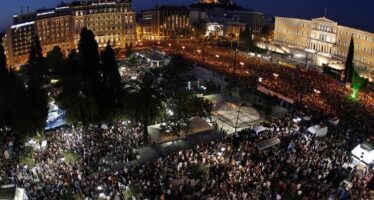Indigenous peoples in Argentina: “We are strangers in our own country”
![]()
 Indigenous Peoples in Argentina have been demanding respect for their rights.© Atilio Orellana / Infoto
Indigenous Peoples in Argentina have been demanding respect for their rights.© Atilio Orellana / Infoto
“We want to live as human beings. We don’t want to be considered as strangers in our own country, poor or useless. We want to live without discrimination. We don’t want blood shed, we just want to reclaim our community,” said to Amnesty International Félix Díaz, leader of the Qom indigenous community of Potae Napocna Navogoh (La Primavera), in the province of Formosa, Argentina.
For decades, indigenous peoples in Argentina have been treated like second class citizens, subjected to violence, intimidation and discrimination with their human rights ignored. In recent months, their claims and demands have started to gain traction on the political and social agenda in Argentina.
Over the last few years state and private interests, especially those of the agribusiness and extractive industries, have built up enormous barriers between Argentina’s native population and their rights to their traditional lands. The UN Special Rapporteur on Indigenous Peoples has criticised the lack of consultation with the communities that may be affected by development projects and exploitation of natural resources.
But it’s not just land disputes that cause problems. Rampant discrimination in the country has often meant that their voices are not heard.
In November 23, 2010, La Primavera’s people blocked the 86 National Route for four months, to protest against the building of a National University on what they understood to be their ancestral lands. Police violently broke up the protest, shooting at those gathered on the road. The episode ended tragically, with a protester and a policeman dead, several injured and some houses burned down.
These events prompted the Inter-American Commission on Human Rights (IACHR) to intervene issuing precautionary measures demanding that Argentina stop the violence. Unfortunately, many of these abuses have not yet been properly investigated.
However a window of hope opened in the beginning of July. A Supreme Court ruling ordered the local government and the National Institution of Indigenous Rights (INAI) to submit a plan of action for mapping the territory claimed by the Qom and to guarantee their right to participate and be consulted in the process.
This is a step in the right direction for the recognition of La Primavera land rights. Nevertheless, the struggle against violence and aggression continue for other communities.
On October 12, 2008, Javier Chocobar, a member of the Pueblo Diaguita, in Tucumán province, was shot dead while trying to stop the removal of his community by a local landowner. Although three people were charged with his death, the trial has not started yet.
In the Nogalito (Pueblo Lule) indigenous community in Tucumán, lack of protection for the community is evident. In November 2012, several members of the community were beaten and threatened with death by individuals who were seeking to take over the community’s land. The attacks led the Inter-American Commission of Human Rights to issue precautionary measures to guarantee the life and physical integrity of the members of Nogalito. However, in June 2013 the Community House was burned in a further attempt to intimidate the community.
At the root of many of these conflicts lies the question of the lack of legal ownership over the ancestral indigenous lands.
Argentina’s Constitution and the international human rights law already recognize the right of indigenous peoples to their ancestral lands. Further, in 2006, the National Congress passed a law that ordered the suspension of evictions of all indigenous peoples until the ancestral lands had been mapped through a survey, but it did not define an appropriate delivery of community property titles to Indigenous People.
Unfortunately, almost eight years on, the evictions continue to take place. The mapping surveys are, in most, cases delayed.
In spite of the enormous challenges and violence faced by Argentina’s indigenous peoples, they refuse to give up their claim to their ancestral lands.
“The land is our life. From it we obtain the food and medicines we need. It provides us with the natural resources to make our houses, for our livelihoods. Without the land, we the indigenous people will lose our spiritual roots,” sums up Félix Diaz.
Related Articles
France: Scores of Roma left homeless in forced eviction near Paris
![]()
Around 150 Roma were forcibly evicted from this informal settlement in Noisy-le-Grand, an eastern suburb of Paris. © Amnesty International
El niño soldado ante una corte militar
![]()
Khadr escuchó atentamente los argumentos de su caso. Imagen: AFPMAR KHADR TENIA 15 AñOS CUANDO FUE CAPTURADO Y LLEVADO
THE NAME OF DiEM25’s GREEK POLITICAL PARTY…
![]()
As February comes to an end, DiEM25 voted to approve MeRA25, its electoral wing in Greece



